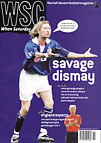 While the media spotlight was firmly fixated on the September 11 attacks, Swansea City acted swiftly and promptly to replace manager John Hollins. Huw Richards reports on the smooth transiton amidst financial uncertainty
While the media spotlight was firmly fixated on the September 11 attacks, Swansea City acted swiftly and promptly to replace manager John Hollins. Huw Richards reports on the smooth transiton amidst financial uncertainty
If Swansea City chairman Mike Lewis wanted to minimise publicity for the sacking of John Hollins and Alan Curtis he could hardly have timed it better. The rest of the world was, of course, preoccupied by the previous day’s events in New York when Hollins and Curtis were fired on September 12.
The rapidity with which Colin Addison and Peter Nicholas were drafted to replace them suggested the ground had been laid before the 3-1 defeat at Plymouth on September 11 which precipitated the sackings. The electronic rendering of the Hallelujah Chorus on one fan’s unofficial website expressed what many felt, but some postings on the site indicate that triumph was far from a universal emotion.
By the standards of normal employment, Hollins and Curtis were unlucky. They inherited a club which had finished 20th in the Third Division and left it seven or eight places higher. Football’s criteria, as we all know, are different, demanding constant progress or at least the promise of it. Their three seasons in charge saw a cup run, a promotion and a relegation. That suggests that being a Swansea City supporter has been an exciting experience recently, but sadly it ain’t so.
The cup run, peaking in a replay victory over West Ham, was a pure joy. Winning the Third Division championship was certainly good too, but that team was a genuine rarity – one whose keenest fans felt was not as good as its results indicated. Some of us did develop a slightly perverse taste for the ground-out 1-0 victory, but it was never quite enough to satisfy followers of a club who have generally tried (not always successfully) to play attractive football. Last season was unmitigated misery.
Hollins could fairly plead limited resources. On one of the traditional means of combating this – developing young players – he had a good record. On the other – spotting transfer bargains – he did less well. It was not that you could point to many bad deals – new striker Mamady Sidibe is a class above previous target-men while releasing midfielder Martin Thomas, much mourned by some, has been fully justified by the development of Gareth Phillips.
The trouble is with the deals that were not made. Hollins was admirably loyal to the squad which won promotion and right to argue that change can be destabilising. But the Swans did not sign a single player from another League club during his time in charge, and it became increasingly clear he lacked the contacts and detailed knowledge of the lower divisions and non-League that made a predecessor like Frank Burrows such an effective operator. Addison’s record suggests he should do better.
There is genuine sympathy for Curtis – one of the club’s great players and this generation’s apparent succesor to Harry Griffiths, the old retainer who inherited the club at its low point in 1975 and laid much of the ground for John Toshack. He took his dismissal with characteristic grace. There was a good case for making him manager now and his chance (or misfortune, depending on how one looks at it) should still come.
Typically, one of Curtis’s last acts was to donate a signed shirt to the Swansea City Supporters Trust fundraising auction – a reminder of one of the few pieces of unquestionably good news this year. Speaking to a Supporters Direct staffer, I had the rare experience of hearing the words “Swansea City” and “well-organised” in the same sentence. The inaugural meeting was attended by around 400 people and the auction raised £2,000.
But that success, borne of genuine fears for the club’s future, is also a reminder that changes of management are dwarfed in importance by financial worries. The hunt for new backers began badly last season with an idiotic series of rumours about the alleged interest of various Welsh celebrities, the effect of which was to make the club a laughing stock.
Lewis says he is talking to a number of consortiums, but remains mystified that a city of around 250,000 – with a hinterland at least twice that – cannot or will not support viable professional football. In the Third, Swansea, like Plymouth and Hull, count as a relatively big club. But if backers cannot be found, a continuing struggle – made no more palatable by Cardiff’s current success – looks inevitable.
From WSC 177 November 2001. What was happening this month